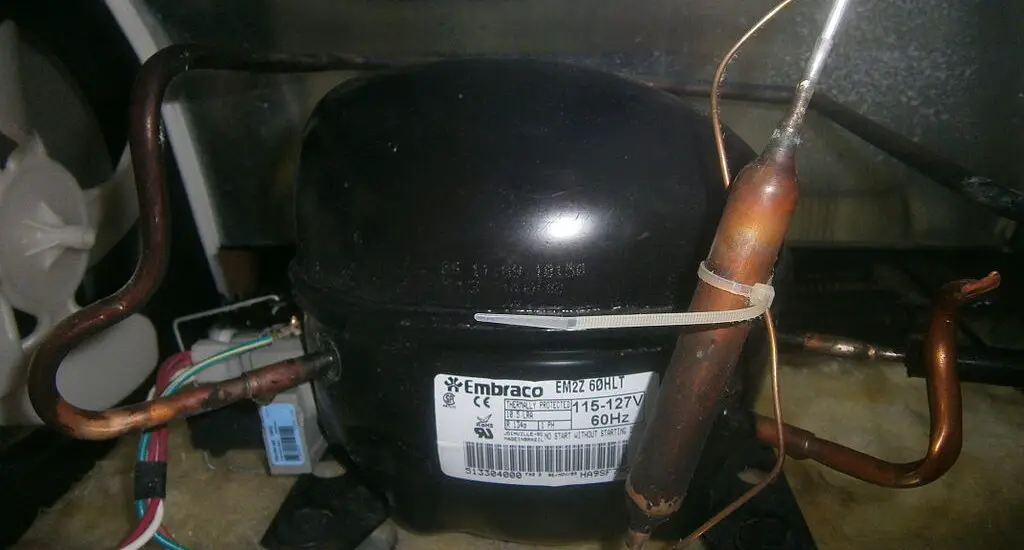If you’re pondering the question, “Do refrigerator compressors have oil?”, you’ve come to the right place. This complete guide thoroughly answers this question and explains its importance for your refrigerator’s functionality and longevity.

Table of Contents
Do Refrigerator Compressors Have Oil?
The direct answer to this question is yes, refrigerator compressors do have oil. But what does this oil do? This specialized type of lubricant is vital for the mechanical functioning of the compressor. Inside the compressor are various moving parts, including pistons, valves, and bearings.
The oil forms a lubricating film on these parts, reducing the amount of friction they encounter during operation. In doing so, it prevents excessive wear and tear that can shorten the compressor’s lifespan. Imagine the compressor as a car engine; just as a car engine requires oil for lubrication, so does the refrigerator compressor.
If you ever experience an oil leak or see any signs of oil contamination, it’s crucial to get it inspected by a professional technician. Operating a compressor without sufficient oil can cause irreversible damage, leading to costly repairs or the need for a replacement.
Types of Oil Used
Not all oils are created equal when it comes to your refrigerator compressor. The two most common types of oils used in this context are mineral oils and synthetic oils.
Mineral Oils: Derived from petroleum, mineral oils are one of the most commonly used oils in older refrigerator models. They offer good lubrication but may not perform as well at extremely high or low temperatures.
Synthetic Oils: These oils are engineered to have specific characteristics, including a higher tolerance to extreme temperatures and pressures. Because of these enhanced properties, synthetic oils are generally more expensive but offer better performance and may extend the lifespan of your compressor.
An example of a synthetic oil is the available at Walmart. If your refrigerator uses any of the HFC refrigerants (R-410A, R-407C, R404A, and R-134a), you can use this oil to lubricate your refrigerator provided it is specified for use in the refrigerator’s manual.
It’s crucial to use the type of oil specified in your refrigerator’s manual. Using the wrong type can lead to increased friction, heat, and ultimately, compressor failure. If you’re unsure which oil to use, consult a qualified technician or the customer service of your refrigerator’s brand.
Check out these other articles…
Can a Refrigerator Compressor Catch Fire? Detailed Answer
Can a Refrigerator Compressor Be Recharged? Quick Answer
Do Refrigerator Compressors Get Hot? Comprehensive Answer
Can I Replace a Refrigerator Compressor Myself? Quick Answer
What Makes a Refrigerator Compressor Go Bad? 3 Major Factors
Do Refrigerator Compressors Have Capacitors? Detailed Answer
Why Oil Is Important
The role of oil in a refrigerator compressor is multi-faceted and essential for the unit’s overall health and efficiency.
Lubrication: As mentioned earlier, the primary function of the oil is to lubricate the internal moving parts of the compressor. This lubrication is crucial for reducing the wear and tear on these components, thereby extending the lifespan of the compressor.
Temperature Regulation: The oil absorbs some of the heat generated by the compressor’s moving parts, helping to regulate the unit’s temperature. A well-lubricated compressor is a cooler compressor.
Energy Efficiency: A well-lubricated compressor doesn’t have to work as hard, which means it uses less energy. Over time, this can result in significant energy savings.
If your compressor’s oil levels are low or the oil is contaminated, the compressor may operate inefficiently, consume more energy, and even break down prematurely. Therefore, keeping an eye on the oil quality and levels is paramount for maintaining your refrigerator’s overall health.
Maintaining Oil Levels
Proper maintenance of the oil level in the compressor is crucial for the longevity of your refrigerator. While most modern refrigerators are designed to not require regular oil changes, older models might need periodic maintenance.
If you notice odd noises from the compressor or a decrease in cooling efficiency, these could be signs that the oil level needs checking. Always consult a certified technician for this task to ensure it is done correctly and safely.